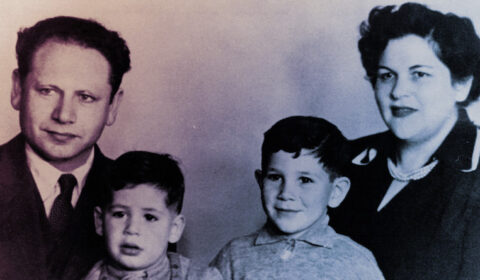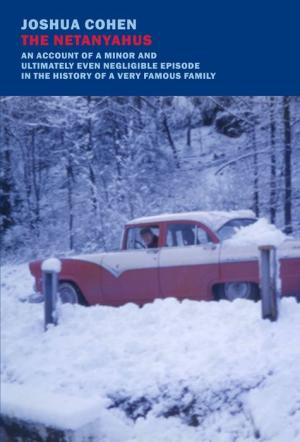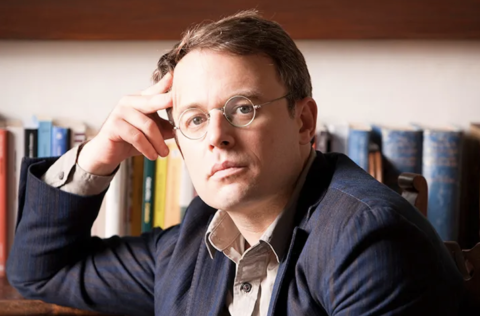The narrator of The Netanyahus is Ruben “Rube” Blum, a nice Jewish boy from the Bronx who has become the only Jewish professor at Corbin College in upstate New York — “and I don’t mean the first tenure-track Jewish faculty member in the Corbin College History Department, I mean the first Jew in the whole entire school — faculty and, as far as I could tell, student-body included.” Blum specializes in taxation studies, “the history of tax policy’s influence on politics and political revolution” and, as he is quick to emphasize, “I am a Jewish historian, but I am not an historian of the Jews.”
 As the only Jewish family in the small college town, Blum and his wife Edith are subjected to “a constant sort of low-level condescension: the sense that we should feel lucky to be there at all; that we’d been admitted, we’d been given a pass.” They are sharply aware that “for my generation … the most reliable protection was to assimilate, not to differentiate.” In addition, it is assumed that, as the “house Jew,” Blum will take on a number of ethnically-stereotypical functions, such appearing as Santa Claus at a faculty Christmas party. Although taxation history has no relevance to medieval history, he is asked to serve on the hiring committee that is reviewing an Israeli scholar of medieval Jewish history and asked “to sort of welcome him here and chaperone him around, sort of make him feel comfortable.”
As the only Jewish family in the small college town, Blum and his wife Edith are subjected to “a constant sort of low-level condescension: the sense that we should feel lucky to be there at all; that we’d been admitted, we’d been given a pass.” They are sharply aware that “for my generation … the most reliable protection was to assimilate, not to differentiate.” In addition, it is assumed that, as the “house Jew,” Blum will take on a number of ethnically-stereotypical functions, such appearing as Santa Claus at a faculty Christmas party. Although taxation history has no relevance to medieval history, he is asked to serve on the hiring committee that is reviewing an Israeli scholar of medieval Jewish history and asked “to sort of welcome him here and chaperone him around, sort of make him feel comfortable.”
The candidate under consideration is Ben Zion Netanyahu, remembered today as the father of Israel’s controversial and long-serving Prime Minister Benjamin Netanyahu, and of Yonatan Netanyahu, a hero of the 1976 Entebbe rescue. To everyone’s surprise, Ben Zion arrives for his interview accompanied by his impossible wife Tzila and their three wildly undisciplined sons, Yonatan (Yoni), Benjamin (Bibi), and Iddo. After their arrival, Blum’s world — characterized by his own bored wife and angry daughter, as well as by considerable professional insecurity — falls apart entirely as the Netanyahus take over and virtually destroy his house and his life.
For the first two-thirds of the novel, Cohen pointedly and often hilariously deals with themes of anti-Semitism, assimilation, academic politics, and family dynamics. In addition, he provides information about the political history of Zionism. In real life, Ben Zion was a follower of Vladimir “Ze’ev” Jabotinsky, who called for a Jewish state to be established within the full territory of British-mandate Palestine. Jabotinsky’s approach stood in opposition to that of leaders such as David Ben-Gurion and Chaim Weizmann, who supported a more moderate and pragmatic Zionism. This information is critical to understanding Ben Zion’s philosophy and provides a key to some of his middle son’s political behavior.
 Cohen cleverly presents this history lesson in a chapter designed as a lengthy letter of reference from a former colleague at Hebrew University in Jerusalem in support of Ben Zion’s application for a position at Corbin College. In the letter, Ben Zion is described as a man “afflicted with the hubris of the wounded intelligentsia,” and his former colleague notes that “few if any of us here at Hebrew University … would object to Netanyahu obtaining a position for himself at some American institution of higher learning; indeed, at any institution of higher learning beyond the borders of Israel.” In addition: “Unlike the Zionists of Vienna, Budapest, and Switzerland, he [Ben Zion] refused to wait for the world to ‘give’ the Jews a homeland, whenever and wherever the great powers pleased; God had already ‘given’ the Jews a historical homeland in Palestine; it was there, it was waiting for them … all they had to do was take it.”
Cohen cleverly presents this history lesson in a chapter designed as a lengthy letter of reference from a former colleague at Hebrew University in Jerusalem in support of Ben Zion’s application for a position at Corbin College. In the letter, Ben Zion is described as a man “afflicted with the hubris of the wounded intelligentsia,” and his former colleague notes that “few if any of us here at Hebrew University … would object to Netanyahu obtaining a position for himself at some American institution of higher learning; indeed, at any institution of higher learning beyond the borders of Israel.” In addition: “Unlike the Zionists of Vienna, Budapest, and Switzerland, he [Ben Zion] refused to wait for the world to ‘give’ the Jews a homeland, whenever and wherever the great powers pleased; God had already ‘given’ the Jews a historical homeland in Palestine; it was there, it was waiting for them … all they had to do was take it.”
Ben Zion and his family arrive at the college for his presentation to the faculty only to find that their hotel reservations have been inexplicably cancelled. The Blums politely invite them to stay at their home, and their guests’ increasingly chaotic interactions reflect both inter-family dynamics as well as the tensions between Israel and the Diaspora. Ben Zion, Tzila, and their oblivious sons wreck the Blums’ home. The Blums remain bewilderingly passive in the face of this increasingly bizarre behavior. At this point, not only do they lose control of their guests, but Cohen himself starts to lose control of his narrative. The final scenes aren’t funny, they aren’t satiric, they’re not burlesque. In fact, I find that they almost defy description; they include Yoni’s running naked through the winter snow, Iddo “curled fetal atop a mound of gingerbread house scraps and glass” from the broken television cabinet he has “tipped over face-first,” and Edith assaulting Tzila and “tackling her into a snowbed.”
The book does not end here, nor with Blum, ever the loyal Jewish boy, protecting his people by telling the local sheriff that the parents of wild intruders are “Turks … what did you expect? … just a bunch of crazy Turks.” The novel concludes with Cohen’s afterword entitled “Credits & Extra Credit” in which he seeks to put his text into greater historical and personal perspective. He writes about his admiration of the eminent literary critic Harold Bloom, on whom the character of Reuben Blum is very loosely based. (As Cohen explains, his novel is based on an anecdote Bloom once told him about his own role in Ben-Zion Netanyahu’s job interview at Cornell. There’s some recent controversy as to whether this anecdote was an factual representation or something Bloom added to his prodigious store of not-always-quite-accurate memories.)
 Cohen expresses his fondness and admiration for Bloom, but his final comments about some of the real people on whom several minor characters are based takes on a disturbing edge. Calling a family that creates chaos “the Yahus” is clever. But referring to a minor character based on, and sharing a name with, a living person whom the author has never met (the real-life youngest Netanayhu brother, Iddo) by the derogatory terms “runt” and “runtling” is as inappropriate as describing someone as a “cripple.” Cohen’s grudge may be based on Iddo’s reluctance to return his telephone calls and meet him in person, a reasonable strategy for a member of a prominent family who retains his privacy. Similarly, Cohen’s inclusion of an angry letter from the woman on whom the Blums’ fictional daughter is based may strike some readers as mean-spirited and unnecessary.
Cohen expresses his fondness and admiration for Bloom, but his final comments about some of the real people on whom several minor characters are based takes on a disturbing edge. Calling a family that creates chaos “the Yahus” is clever. But referring to a minor character based on, and sharing a name with, a living person whom the author has never met (the real-life youngest Netanayhu brother, Iddo) by the derogatory terms “runt” and “runtling” is as inappropriate as describing someone as a “cripple.” Cohen’s grudge may be based on Iddo’s reluctance to return his telephone calls and meet him in person, a reasonable strategy for a member of a prominent family who retains his privacy. Similarly, Cohen’s inclusion of an angry letter from the woman on whom the Blums’ fictional daughter is based may strike some readers as mean-spirited and unnecessary.
These needlings of the actual Netanyahus triggered a harsh review of the novel by Allan Arkush in the Jewish Review of Books — and an equally intense rebuttal by Cohen — both of which may entertain you. The first of several responses in the article’s comments section begins, “You guys need to lighten up.” It’s good advice for the reader to keep in mind. If only Middle Eastern politics worked that way.
[Published by New York Review Books on June 22, 2021, 258 pages, $16.95 paperback]